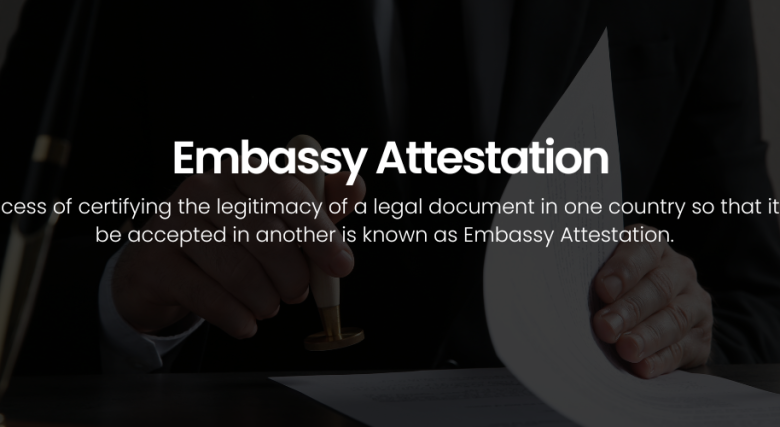The Importance of Embassy Attestation for International Document Verification

Introduction: Our globalized world makes document authenticity essential, whether for employment purposes, education requirements, legal proceedings or legal disputes. One key part of international document verification processes such as Embassy Attestation serves to lend credibility and validity to documents issued in one country and intended for use elsewhere. This article delves further into its significance within international document authentication processes.
Embassy Attestation serves as an efficient mechanism to verify documents’ legitimacy. When attested by an embassy of another nation. This confirms their legitimacy for use when immigrating, working abroad, marrying abroad or seeking academic pursuits abroad. This validation can prove especially vital when seeking immigration status or studying at foreign institutions abroad.
Documents attested by embassies are widely recognized internationally, whether traveling for education, employment or business purposes. Their acceptance in host nations helps facilitate an easy transition with no legal complications along the way.
Preventing Fraud and Misrepresentation:
Embassy Attestation can serve as an effective deterrent against fraud and misrepresentation. By verifying documents at their source country embassy before being sent out for attesting in the destination country, authorities in both locations can have confidence that information provided is genuine, discouraging individuals or entities from providing falsified or falsified documentation to present to authorities as proof. Such scrutiny discourages counterfeit or misleading documents being presented for consideration.
Embassy Attestation Facilitates Global Mobility:
When seeking global mobility, Embassy Attestation makes the document verification process simpler for professionals seeking job opportunities abroad. Students applying to study internationally; its attested documents expedite visa applications and improve their chances of acceptance – something especially crucial when time-sensitive situations arise.
Build Trust and Confidence: Trust is integral to international businesses and collaborations, so documents attested by embassies help instill it among partners, clients, and stakeholders. These attestation documents show transparency when running operations according to legal and ethical requirements – this trust serves as the cornerstone for successful international partnerships and collaborations.
Importance of Embassy Attestation
Embassy Attestation serves a vital function in our globalized world by validating documents that cross international boundaries, from educational pursuits and professional endeavors through legal procedures or international collaborations requiring official papers for verification purposes. Of Qatar Embassy Attestation Services can play an invaluable role here by offering formal validation services across international boundaries – this article explores its many uses in globalizing societies today.
1. Assure Document Authenticity:
Embassy Apostille provides an effective method for verifying documents like educational certificates, marriage licenses, business contracts, and legal affidavits to guarantee their authenticity and genuineness. When documents are attested by foreign embassies it signifies they have undergone intensive verification to assure its legitimacy. This authentication process plays an essential role when used internationally in legal proceedings or official communications.
2. International Receptivity and Approval:
Documents attested by embassies are widely recognized and accepted across borders. Whether applying for jobs overseas, seeking admission into foreign universities or engaging in international trading activities. Their acceptance increases credibility with host country authorities ensuring smooth flow for various processes including immigration to business transactions.
3. Preventing Fraud and Misrepresentation:
Embassy Attestation can serve as a powerful deterrent against fraud and misrepresentation, helping authorities in destination countries build confidence in the information being presented by individuals or entities seeking to falsify documents by verifying them at their source country’s embassy. By conducting rigorous examination of documents coming out of source countries’ embassies for verification in destination countries’ embassies. This prevents individuals or entities from producing counterfeit or misleading documentation which helps uphold legal and administrative systems integrity.
4. Promoting Global Mobility: Facilitation Strategies.
HRD attestation in India speeds the document verification process, thus increasing global mobility for individuals and businesses alike. Be it seeking employment opportunities abroad or exploring international ventures for expansion purposes, attested documents streamline visa applications, work permits and legal proceedings to make life simpler – something particularly helpful during time-sensitive situations.
This comprehensive guide offers step-by-step guidance through the complex procedure of Embassy Attestation for international document validation.
Step1: Establish Document Requirements:
Understand the requirements for attesting the document you need. Different documents like educational certificates, marriage licenses or commercial contracts might have specific specifications regarding attestation.
Step 2: Local Attestation.
Before proceeding with any document submission to an embassy, local authorities often need to authenticate it first. This may involve verification by notary publics, state Home Departments, HRD Ministries and/or other local bodies that best suits its nature.
Step 3: Ministry of External Affairs (MEA) Attestation
Once local attestation has taken place, documents need to be checked by your nation’s Ministry of External Affairs before being forwarded onto their intended country’s embassy for final attestation. Attestation by MEA serves two essential purposes; validating authenticity while making certain your document meets requirements set out by its host government’s Embassy for authentication purposes.
Step 4: Embassy Attestation.
Once a document has been authenticated by MEA, it must then be sent off for attestations by its intended country’s embassy. Each embassy may have different requirements, fees and processing times – it’s best to visit their official website or reach out directly for the most up-to-date and precise information on attestation processes and requirements.
Step 5: Translation and Notarization (If Necessary):
Documents not in their country of destination might require to be translated and notarized before travel; ensure this translation is done accurately by an accredited translator.
Step 6: Legalization by the Ministry of Foreign Affairs in your Destination Country:
Some countries require additional verification from their Ministry of Foreign Affairs after having received documents attested by an embassy. This step ensures that documents sent overseas will be recognized by their destination country governments.
Step 7: Final Verification by Relevant Authorities:
Depending upon its purpose, certain documents require to be validated by local authorities. In their destination country to make them legally valid for their intended use. This step completes the validation process.
Conclusion:
With constant movement of people and information, document authenticity cannot be taken for granted. Embassy Attestation serves an integral role in international document verification – validating documents while building trust among international partners as it facilitates seamless global mobility. Understanding its significance for individuals, businesses, or institutions engaging in international activities serves as the cornerstone for collaboration and cohesion internationally.



